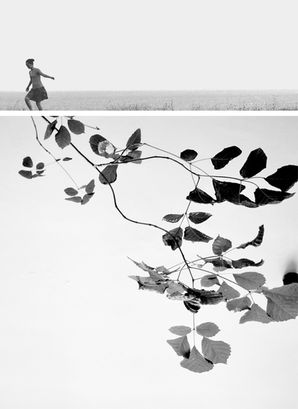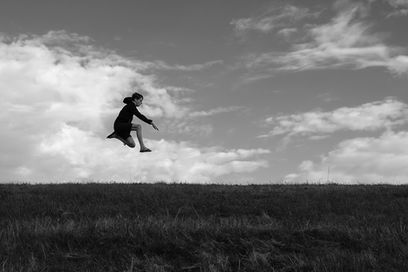
PURSUING THE DREAM
December 8, 2021
INTERVIEW
PHOTOGRAPHY Sharon Eilon
INTERVIEW Melanie Meggs
Sharon Eilon has taken a unique journey to fulfil her dream of becoming a photographer. After suffering a major health crisis, she sought treatment in India and returned home with a newfound perspective on life. Seeing the world through her camera lens has become a meditative experience, providing her an opportunity to be one with the present moment. Through her photography, Sharon has captured the human spirit in ways that inspire and evoke emotion. From her home base of Israel, she has traveled the world, capturing stories of people who are fighting for justice and creating a better world. Sharon's story is an inspiring tale of strength and courage and a reminder that anything is possible when we pursue our dreams.

“I was born and raised in Israel. In my daily job I am an algorithms engineer. A few years ago, I went through a major health crisis that led me to seek medical treatment in India. After a period of four months alone in India, away from my family and kids, I came back home healthy and with a deep sense of gratitude for getting my life back. This healing journey was also very spiritual for me and changed me in many ways. I decided to make my dream come true and started a basic photography course. Since then, for the past two years, I have been regularly studying photography in various courses and schools. Photography has become my true passion, my way of observing the world, my way of expressing myself.”
IN CONVERSATION WITH SHARON EILON
THE PICTORIAL LIST: Sharon, how have the streets and culture you capture influence your photography? How have your captures changed the way you see Israel?
SHARON EILON: I am inherently drawn to photographing in the streets. Soon after I started photographing, I realised that my photos almost always include a human being in the frame. Street photography and culture photography became my main areas of interest. I am fascinated by people, by human activities and especially by human interactions. The Israeli society is a multi-sector split society, and this is one of its major challenges. Through my photography I feel I can see beyond the rifts between us and instead look further into our common ground.
TPL: Talk to us about your project CHURCH OF THE HOLY SEPULCHRE that you submitted. What do you want the viewer to experience and take away with them?
SE: This is a story of a very special place, the CHURCH OF THE HOLY SEPULCHRE is located in the old city of Jerusalem. The site of the church is widely believed to be the place of both the crucifixion and the resurrection of Jesus Christ. The church has long been a major pilgrimage center for Christians from all around the world. For me as a Jewish person, visiting this place is more of a spiritual experience rather than a religious one. I wish the viewer would feel what I feel when I enter this place: a reverent silence, a sense of childlike wonder, marveling at the holy atmosphere this place encapsulates.
*Editor's note - Read Sharon's story on the website via the link below.
TPL: What are some tips or advice you would give yourself if you started photography all over again?
SE: It is hard for me to answer this question, as I consider myself to be at the beginning of my photography journey. However, I can borrow one important tip that one of my photography teachers told us in the opening lesson of the course. She said: "In art, there are no mistakes, only opportunities."
TPL: Do you ever get burnt out creatively? Explain how you keep the creative energy flowing.
SE: For me, strolling the streets of big cities always evokes visual creativity. I walk with an open awareness to the people and situations around me and find interesting characters and stories on the fly.
TPL: Who are your favourite artists?
SE: So many… but I will try to name a few photographers whose work I particularly admire: Martin Parr, Elliott Erwitt, Vivian Maier, Mary Ellen Mark, Joel Meyerowitz, Alex Webb, Richard Avedon and of course Henri Cartier-Bresson.
I appreciate the richness of the Israeli society and see its beautiful facets everywhere I am photographing.

TPL: If you could just choose one photographer to shoot alongside for a day...who would you choose? And why?
SE: I think it would be Martin Parr. I love his way of documenting the leisure aspect of life in England. He manages to convey a whole range of emotions (and often contradicting ones) in his bright and colorful frames.
TPL: When you are out shooting - how much of it is instinctual versus planned?
SE: I must admit that currently my way of shooting is more instinctual. But as I grow, I learn that many frames at different locations would benefit a more planned approach. Each approach had its own advantages, but the true wisdom is to use both and choose the approach that best suits the current moment.
TPL: Does the equipment you use help you in achieving your vision in your photography? What camera do you use? Do you have a preferred lens/focal length?
SE: I am using a mirrorless SONY Alpha a7 III camera, and I admire its impressive auto-focus system. Its accuracy and speed are a huge advantage for shooting dynamic scenes on the street.
TPL: What are some of your goals as an artist or photographer? Where do you hope to see yourself in five years?
SE: My goal is to learn and develop in a more artistic direction. I want to use photography as a way of self-expression, to find my authentic voice and show it to others, to be able to create a way of interaction with the world that is beyond words. I want the photography process to help me observe the current moment without judgment but rather with an open heart.
TPL: Are there any special projects you are currently working on that you would like to let everyone know about?
SE: I am currently working on two projects that are quite different from the work I did so far. They are not candid photography in nature and include staging of my main characters within the framework of street photography and documentary photography. I hope to publish them soon and I am very curious to see the responses to these projects.
TPL: When I am not out photographing, I (like to)…
SE: I love reading books before I go to sleep, listening to music, learning philosophy and Buddhism. Generally, I am a curious person who loves asking questions. I hope this childish curiosity will always be part of me.

Sharon Eilon's story should be an inspiration for all of us to never give up on what we believe in, no matter how long and difficult the journey. We must strive to keep fighting for what we believe in and work hard to make our dreams come true. Let us take her story and use it to fuel our own dreams and aspirations.









































